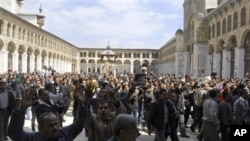An Egyptian American who participated in protests that ousted President Hosni Mubarak now finds himself in trouble in Syria, where authorities arrested him for allegedly taking photos of similar protests there.
Mohamed Radwan is an Egyptian American living in Syria. But since he moved there nine months ago, he has traveled to Egypt frequently to watch the country's revolution firsthand. Last month, he took VOA on a walking tour of Cairo's famous Tahrir Square, describing his motivation to visit Cairo in revolutionary times.
"I was really ill in Damascus where I live right now. I woke up, I had a fever and I was hallucinating, and I was by myself. When I came to, I realized, 'there's a revolution going on.' So I bought a ticket within half an hour, and I got here on the morning of the 28th (of January)," he said.
Like many who've lived in the Middle East or have relatives there, Radwan was fascinated by the wave of pro-democracy protests sweeping the region. He works as an engineer in Damascus, but hopped a flight to Cairo and stayed until Egyptian President Hosni Mubarak relinquished power on Feb. 11.
But similar curiosity about Syria's recent protests has landed Radwan in jail. His cousin, Nora Shalaby, said the last she heard from Radwan was a message he posted on Twitter on Friday. "His last tweet said he was at the Umayyid mosque in Old Damascus. I guess he went to just see what was going on because he had heard that there were going to be protests and stuff," she said.
A day later, her worst fears were confirmed.
Radwan appeared on Syrian television on Saturday as a prisoner, in what looked like a forced confession. State media accused him of selling photos and video from the Syrian protests, and also said he visited Israel, which is considered a crime in Syria.
"Everything he was saying didn't make sense, and it was obvious he was being forced to say these things. He looked really troubled and worried. Mohamed is a very easy-going guy, he's always joking and smiling and laughing. But he looked really serious and worried. I am really worried about him," she said.
Radwan is the second American citizen to be detained in Syria recently. Another 21-year-old college student from Vermont is also in custody. A spokesman for the US Embassy in Damascus said U.S. authorities are in constant touch with Syrian officials, to try to gain access to the men. Two Reuters television correspondents, both Lebanese, also were detained in Syria over the weekend and released Monday.
Shalaby said that while Radwan attended protests in Egypt, where he spoke with VOA, he did not participate in Syrian rallies.
"He had no contact with any political activists or anything. He didn't know that many people in Syria, and he was in Egypt a lot of the time. He's been in Syria for 9 months (working) but he used to come to Egypt a lot. He didn't know many people there and wasn't involved in political activity at all," she said.
Last month, VOA asked Radwan what he thought the chances were of Egypt's revolution spreading to other countries. "You know, it definitely depends on the circumstances and the kind of mentality they have in Bahrain, Algeria or Yemen - three completely different countries in their use of force and the mentality of their dictator or monarchy," Radwan said.
As he predicted, protests have indeed hit those countries. But Radwan did not expect back then to see protests in Syria, let alone be arrested there. He had some close calls in Cairo: He was lightly wounded by birdshot bullets fired in a protest crowd there on Jan. 29.
But his cousin Shalaby fears a fate far worse in Syria. "We know that the Syrian regime is very brutal, like 10 times worse than the Mubarak regime was. So we're just worried that he disappears," she said.
Until Friday, Radwan was an avid Twitter user, posting musings on the micro-blogger site. Now a Facebook group entitled "Free Mohamed Radwan" has been created in his honor, with more than 3,000 followers. But his Twitter account, for now, remains silent.
Egyptian American Held in Syria for Allegedly Taking Photos of Protests













